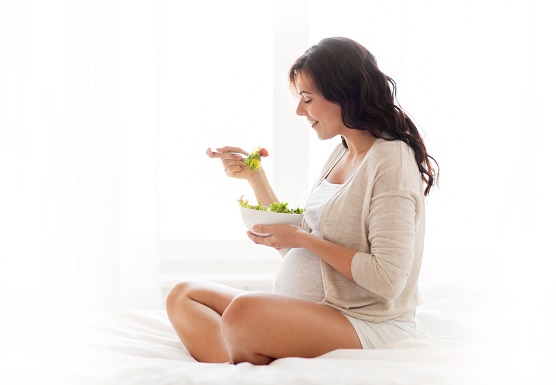
You often hear it said that when you’re pregnant you’re ‘eating for two’. But that doesn’t mean you should eat double of everything. Sarah Sinaram, Head of Nutrition and Dietetics Department at Mount Alvernia Hospital, explains why diet matters more than ever when you’re expecting.
HOW MUCH MORE
According to the Health Promotion Board (HPB), pregnant women require a surprisingly modest 300 or so calories a day more than their pre-pregnancy requirements, depending on their activity levels. To help you visualise those extra calories in real terms, ponder this – one bowl of fishball noodles, served dry, has about 370 calories, a plate of nasi lemak has 494 calories and one piece of plain roti prata has around 200 calories.
As you can see, it can be easy to chalk up the calories when eating out, which may lead to excessive weight gain. Gaining excess weight in pregnancy increases a woman’s risk of developing gestational diabetes and hypertension. The extra kilos can also make childbirth difficult, which in turn prolongs mum’s postnatal recovery. Overweight mums also tend to have larger babies who will be at risk of becoming obese and diabetic in later life.
On the other hand, gaining too little weight may cause premature birth or a low birth weight baby. Women who suffer from morning sickness may have trouble keeping food down and even lose weight in the early months. Thankfully, morning sickness usually improves in the second trimester, when weight gain picks up. Given the importance of adequate hydration and nutrition, pregnant women who are gaining too little weight, or not at all, should ask their doctor for advice on managing their nausea and meeting their nutritional needs.
ALWAYS ASK YOUR DOCTOR
Though well-meaning family members may ply a pregnant loved one with advice, urging them to eat some specific traditional supplement, or to refrain from eating very ‘heaty’ and very ‘cooling’ foods, mums-to-be should always consult a doctor before adopting these practices.
In truth, there is no one ‘super food’ that will ensure a healthier, stronger, fairer or smarter baby. Instead, mums-to-be should eat a healthy, balanced diet with food from all four food groups.
Sarah explains why variety is important to ensure that you get the right balance of nutrients. “Different food groups contain different types of nutrients. For instance, fruits are rich in Vitamin C and dietary fibre but lack protein,” said Sarah.
ABOUT VITAMINS AND SUPPLEMENTS
The number of pregnancy supplements on the market attests to the importance of folic acid, iron and calcium intake.
Sarah confirms that women should take note of their folic acid, iron and calcium intakes. Folic acid helps prevent neural tube defects while iron supports babies’ growth and development. It is common for mothers to develop low blood counts in pregnancy as the blood volume increases in pregnancy. Iron supplementation will help to prevent this. Calcium helps maintain mothers’ bone density and babies’ bone development.
“Pregnant women who are vegans may need to look into their Vitamin B12 and omega-3 intake,” advised Sarah. “However, it’s always best to speak to your doctor about supplementation, as he or she will understand your unique requirements and provide you with the appropriate advice.”
A WINDOW OF INFLUENCE ON A LIFETIME OF HEALTH
A healthy diet during pregnancy can have a positive impact on your baby’s entire lifetime.But it doesn’t stop there. After delivery, a healthy diet plays a key role in successful breastfeeding. And, of course, mums (and dads) should continue to eat well and set a good example to their children as they grow into healthy adults.
This article is Part 2 of a 2-part series and contributed by Sarah Sinaram, Head of Nutrition and Dietetics Department at Mount Alvernia Hospital. To learn more about our Nutrition and Dietitian services, click here.
To read on Part 1 of this series, click here.
This article is taken from our My Alvernia Magazine Issue #36. Click here to read the issue on our website or on Magzter.